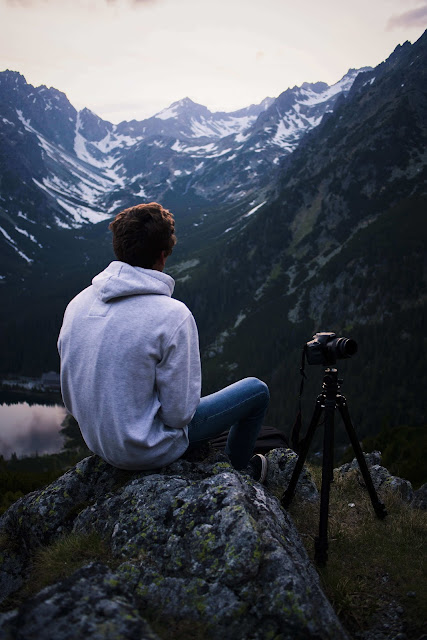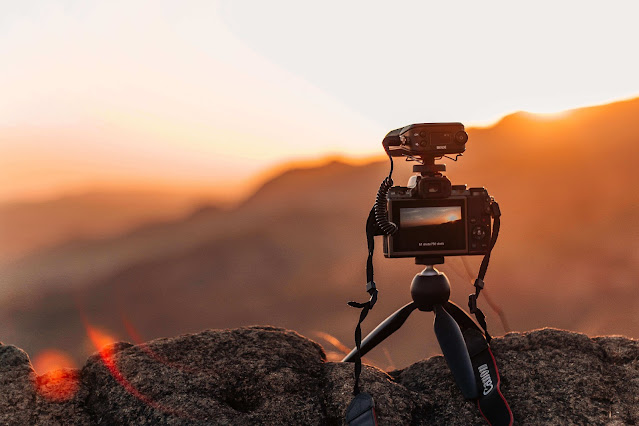10 Steps To be a Professional Photographer In Photography Nature and Landscape Photography 📸
Do you want to learn how to be a professional photographer in landscape photography or photography nature? Have you ever asked yourself what makes
landscape photos so eye-pleasing and beautiful? Landscape photos are more than
a beautiful sunset photo you took with your phone or your camera, many things
make landscape photos beautiful and vibrant.
And in this article, we will learn how to get
the most out of the camera that you use in landscape photography,
which will make everyone who sees it amazed.
Learn how to be a professional photographer in landscape photography
1- Use a good camera
The camera is one of the very important things in photography, although it is often not the main factor in getting good photos, it is very important, so what is the ideal camera that you can use to shoot landscapes and get great photos?
DSLR and mirrorless cameras are the best chow
choices for any photographer, although smartphone cameras have become very
advanced and are amazingly capable of taking amazing natural photos, so far
they have not reached the quality of professional cameras.
What distinguishes professional cameras is that
they are dedicated to photography and contain a larger sensor size, which
contributes to the production of high-quality images, in addition to the
ability to change the lenses and get the best lens for landscape photography,
which is usually a wide lens, as well as the ability to completely change the
camera settings to get the shot you want.
Fortunately, there are now plenty of
entry-level professional cameras that come cheap, but you can invest in your camera
and get a full-frame sensor.
2- Lenses
If you specialize in landscape photography, it
is best to buy the most suitable lens for doing this. The best landscape
photography lenses are wide lenses, starting from a 35-millimeter lens, and usually
lands, cape photographers use a 24 millimeter or ultra-wide lens.
The 24mm lens is very wide, but be careful not
to show things you don't want in the photo because the lens is wide.
3- Tripod
Many landscape photographers shoot by hand,
thinking that their photos will be sharp enough, but soon discover that the
image does not fit due to a slight shake. Your photo is perfect, especially
since some photos need a little shutter.
If you can buy an expensive tripod that is
good, because it is stable enough and resistant to high winds, and always
remember to put the tripod on flat terrain when shooting.
4- Learn the basics of manual exposure
Manual exposure is one of the most important
things in landscape photography and photography in general. You should learn
its basics and adjust its settings in the camera you are photographing with.
Know the shutter speed, ISO, and aperture, and know how much light you need in
the image.
Here are the basics of all of these things:
- Shutter speed: determines the speed required to take the photo. The lower the shutter speed, the more light you allow the camera to take, but when you make it a little, make sure that there are no vibrations in the image.
- Aperture: It is a number expressed by the symbol f, and the lower this number is, the more light is allowed to enter the sensor, and it also affects the depth and blurring of the image.
- ISO: Measures the sensitivity of the camera to light, but its increase may make the image blurry.
Once you've mastered these three things, you'll
be able to get the right settings for each shot.
5- Find good lighting
Thanks to the manual settings on the camera, we
have more freedom to shoot in different lighting conditions, however, the best
light source is natural sunlight, as strong sunlight helps distribute the
lighting and make the colors look more natural.
Landscape photographers often go after sunrise
and before sunset, these are the best times for landscape photography, to get a
beautiful combination of blue and orange in the sky.
6- Use filters
There are two types of filters that
photographers use to enhance their photos, the first is the polarizing filter,
whose job is to cancel out objects that are reflected on the glass, and the
second is the ND filter, which is to control excess light in the image to allow
shooting with slower shutter speeds and wider apertures.
Polarizing filters also improve the colors and
overall appearance of natural images, while the ND filter is used to adjust the
HDR in the image and obtain the best lighting distribution in the image.
7- Make the composition of the image purposeful
The best advice someone can give you to getprofessional, natural photos is to pay attention to the composition of the
image, and in a previous article, we talked about the rules of photo
composition that you can follow to ensure that you get an image that will
interest your viewers and deliver your desired message.
You can follow rules in landscape photography
such as simplification, directing the viewer's eye to the correct scene,
observing the rule of thirds, and balance. Once you get used to using these
rules, you will automatically find yourself using them without feeling.
8- Make sure to set the focus
The most prominent photography mistake that
beginners make is not adjusting the focus on the object to be photographed, you
must always make sure to adjust the focus on the object to be photographed, and
this makes the object be photographed sharp, and makes the rest of the image
blurry so that your subject is distinguished.
To retrieve this, the aperture of the lens must
be at least 2.8, and often landscape photos focus on the foreground and
background of the image only, unlike other types of photography that seek to
show 3GHe slandered the image, which is the foreground, the element to be
photographed, and the background.
It's better to set focus points manually than
automatically to make sure you set them just the way you want them, or you can
adjust them by touch if your camera supports it.
9- Photos RAW (RAW landscape photos)
RAW images are raw images. To get the best
results, you should shoot in RAW format. Compared to JPEG, RAW images retain
all image information without compression, making it easier to use this
information in future image modification, while JPEG images compress image
information to make it less in size.
With RAW shooting, you can easily improve the
lighting of the image in the future or correct colors without degrading the
image quality permanently, in an easier and better way.
10- Get creative
If you go to the same places as other people to
take your photos, you are sure to get the same photos they take, so how do you
differentiate your photos from others? The things we mentioned above all help
you with the mistakes of landscape photography, but what makes too special is
how creative you are in the photo, the more creative you are, the more
professional and unique photos you will get, think of ways to tell the story or
find a way to save A different visual experience.
These were some tips that will help you get the
best landscape photos, and remember that you can always do what you think is
right from your point of view, you are the owner of the photo and you have
every right to get it out as you want.












Comments
Post a Comment
We are waiting for your comments and inquiries